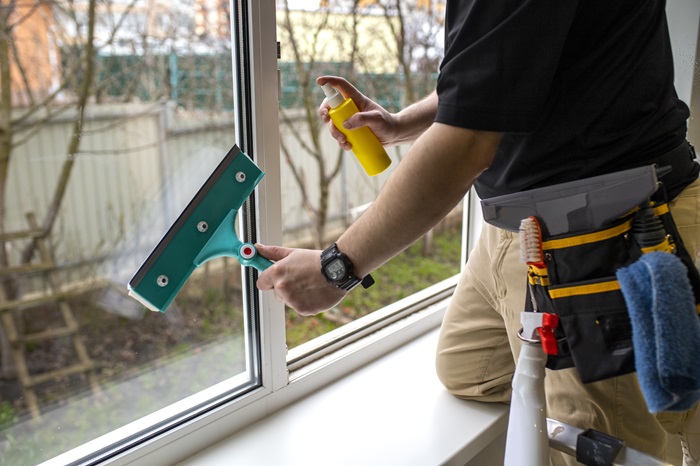How to Maintain Your Windows and Doors for Long-Term Performance

Windows and doors play a crucial role in your home’s functionality and aesthetics. They keep your space comfortable, enhance security, and contribute to energy efficiency. However, without proper care, they can deteriorate over time, leading to higher energy bills, compromised safety, and costly repairs.
This guide provides detailed tips to help you maintain your windows and doors, ensuring they perform well and look great for years to come.
Why Maintenance Matters
Regular maintenance of windows and doors is essential for several reasons:
- Energy Efficiency: Properly maintained windows and doors prevent drafts, reducing heating and cooling costs.
- Security: Functional locks and hinges provide protection against break-ins.
- Aesthetics: Clean, well-maintained windows and doors enhance your home’s curb appeal.
- Longevity: Routine care prevents premature wear and costly replacements.
1. Clean Windows and Doors Regularly
Cleaning isn’t just about aesthetics; it helps prevent the buildup of dirt and debris that can cause damage over time. Follow these cleaning tips:
Glass Surfaces:
- Use a mixture of warm water and mild detergent or a commercial glass cleaner.
- Wipe the glass with a microfiber cloth to avoid streaks.
- Avoid using harsh chemicals or abrasive materials that can scratch the surface or damage coatings, such as Low-E coatings on energy-efficient windows.
Frames and Tracks:
- For vinyl or aluminum frames, wipe down with a damp cloth and mild soap.
- Wooden frames may require a wood-specific cleaner and periodic resealing or repainting to protect against moisture and UV damage.
- Vacuum dirt and debris from window tracks to ensure smooth operation.
Door Surfaces:
- Pay special attention to high-touch areas like handles and edges. Use a disinfectant for added hygiene.
- For metal doors, check for rust spots and treat them with rust remover or a metal primer.
2. Inspect for Signs of Wear and Tear
Regular inspections can help you catch minor issues before they become costly repairs. Schedule monthly or seasonal checks for:\
Windows:
- Cracks or chips in the glass.
- Warping or rotting in wooden frames.
- Fogging between panes of double or triple-glazed windows, which indicates failed seals.
Doors:
- Warping or swelling, especially for wooden doors exposed to humidity.
- Rust or corrosion on metal doors and components.
- Misaligned locks or latches that make closing difficult.
3. Lubricate Moving Parts
Friction can wear out hinges, rollers, and locks, reducing their lifespan. Lubricating these components ensures smooth operation:
- Use a silicone-based lubricant for windows to avoid attracting dirt.
- For doors, apply lubricant to hinges, locks, and handles. Avoid oil-based products like WD-40 for long-term lubrication as they can attract grime.
Pro Tip: Operate the moving parts a few times after applying lubricant to distribute it evenly.
4. Maintain Weatherstripping and Seals
Weatherstripping plays a vital role in preventing air and water leaks. Over time, it can crack or wear out, compromising insulation. Here’s how to maintain it:
- Inspect: Look for signs of peeling, cracking, or gaps in the weatherstripping around doors and windows.
- Replace: If the material shows significant wear, replace it with high-quality weatherstripping. It’s an affordable way to improve energy efficiency.
- Reapply Sealants: For windows, check the caulking around the frames. Remove old, deteriorated caulk and apply fresh sealant to ensure a tight seal.
5. Protect Against Moisture Damage
Moisture is one of the most significant threats to windows and doors, especially wooden ones. Here’s how to guard against it:
Improve Drainage:
- Ensure that drainage holes in window frames are not blocked.
- Check that door thresholds are sealed and sloped to direct water away from the home.
Repaint or Reseal:
- For wooden windows and doors, repaint or reseal them every few years to protect against water absorption.
- Use water-repellent finishes on exposed wooden surfaces.
Inspect Flashing: Ensure flashing around doors and windows is intact to divert rainwater away from the frames.
6. Clean and Repair Screens
Screens are a first line of defense against insects and debris, but they can wear out over time. Here’s how to care for them:
- Remove screens and clean them with soapy water and a soft brush.
- Inspect for holes or tears, and patch small damages using a screen repair kit.
- Replace the entire screen if damage is extensive.
7. Address Seasonal Challenges
Seasonal changes can take a toll on your windows and doors. Adopt specific maintenance practices for each season:
Spring:
- Clean windows and doors thoroughly to remove winter grime.
- Inspect for damage caused by freezing temperatures and snow.
Summer:
- Check for fading or peeling paint due to sun exposure.
- Lubricate components more frequently as higher temperatures can cause parts to expand.
Fall:
- Remove fallen leaves and debris from tracks and drainage areas.
- Replace worn weatherstripping to prepare for colder months.
Winter:
- Avoid using force to open frozen windows or doors; instead, thaw them with warm (not hot) water.
- Ensure all seals are intact to keep drafts out and heating costs down.
8. Upgrade Components When Necessary
Sometimes, maintenance isn’t enough. Upgrading certain elements can significantly improve the performance of your windows and doors:
- Replace single-pane windows with energy-efficient double or triple-pane options.
- Upgrade to weather-resistant materials like vinyl or fiberglass for frames.
- Install modern locking systems for better security.
9. Professional Maintenance and Repairs
While DIY maintenance is effective, some tasks require professional expertise. Consider hiring a professional for:
- Annual inspections to detect issues you might miss.
- Repairs or replacements for damaged glass, frames, or hardware.
- Adjustments to misaligned components.
For homeowners in Toronto, Delco Windows and Doors offers expert maintenance and repair services to ensure your windows and doors remain in peak condition.
10. Tips for Specific Window and Door Types
Different types of windows and doors may have unique maintenance requirements:
Sliding Windows and Doors:
- Keep tracks clean and free of obstructions.
- Check rollers for wear and replace them if necessary.
Casement Windows:
- Ensure hinges and cranks are well-lubricated.
- Tighten screws on hardware periodically.
Entry Doors:
- Inspect door sweeps for wear and replace if they no longer seal properly.
- Use weatherproof paint or stain for wooden doors exposed to the elements.
Conclusion
Maintaining your windows and doors is an investment in your home’s comfort, security, and efficiency. By following these tips, you can extend their lifespan, avoid costly repairs, and enjoy a better living environment.
For professional assistance with maintenance or replacement, contact Delco Windows and Doors in Toronto. We specialize in manufacturing and installing high-quality windows and doors tailored to your needs.











